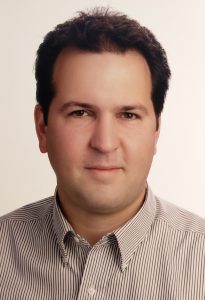
Yakov Nekrich, associate professor, Department of Computer Science, has been notified that two scholarly papers he has authored were accepted by the 36th International Symposium on Computational Geometry (SoCG 2020), which takes place June 23-26, 2020, in Zurich, Switzerland.
Nekrich is a member of the ICC’s Center for Data Sciences.
The two papers are “Further Results on Colored Range Searching,” by Timothy M. Chan, Qizheng He, and Nekrich, and “Four-Dimensional Dominance Range Reporting in Linear Space” by Nekrich alone.
The Annual Symposium on Computational Geometry (SoCG) is an academic conference in computational geometry. Founded in 1985, it was originally sponsored by the SIGACT and SIGGRAPH Special Interest Groups of the Association for Computing Machinery (ACM). It dissociated from the ACM in 2014. Since 2015 the conference proceedings have been published by the Leibniz International Proceedings in Informatics Since 2019 the conference has been organized by the Society for Computational Geometry. (Wikipedia)







https://doi.org/10.1016/j.coldregions.2019.102856